As we read through the Bible, it is good to keep in mind these SMART goals:
S- What does the passage SAY?
M- What did the passage MEAN to its target audience in the historical context?
A- How does the passage APPLY to us in the light of the gospel?
R- How does it RELATE to the person and work of Christ and the New Covenant of God’s Grace?
T- How are we to TEACH these truths and to whom can we teach them? (Deuteronomy 6:6-7; 2 Tim 3:16; 2 Tim 2:2)
The Apostle Paul reminds us that the account of the Israelites in the wilderness is “written for our instruction, upon whom the ends of the ages have come” (1 Corinthians 10:11).
We do not look to the Law of Moses for our right standing with God, but to Jesus Christ. He is the One who, as God, gave the Law. He became man, was born under the law, lived under the law, interpreted the law and fulfilled the Law on our behalf.
To us, who believe, He is the end of the law, for He is “the Lord our righteousness”! (Jeremiah 23:6; 33:16).
“In His days Judah will be saved, And Israel will dwell securely; And this is His name by which He will be called, ‘The LORD our righteousness.’ “(Jeremiah 23:6; 33:16)
Romans 8:3-4 (NASB) 3 For what the Law could not do, weak as it was through the flesh, God did: sending His own Son in the likeness of sinful flesh and as an offering for sin, He condemned sin in the flesh, 4 so that the requirement of the Law might be fulfilled in us, who do not walk according to the flesh but according to the Spirit.
The law has value for us, even though we are no longer under the law. It is a revelation of the righteousness of God. It is a foreshadowing of the Living Righteousness we see in Christ. Rather than living under the law of Moses, the One who fulfilled the law of Moses, the Lord Jesus Christ, now lives in us by the Holy Spirit.
As believers, we have the Holy Spirit of promise. The Holy Spirit turns the law of God into a promise. In Christ, the righteous demands of the law are fulfilled for us. In the Spirit, the righteous demands of the law are fulfilled in us. The law of the Spirit of life in Christ Jesus motivates and animates our lives, bringing forth the fruit of righteousness.
LAWS OF ENTRANCE INTO THE ASSEMBLY
In Deuteronomy 23:1-6 we learn that there were certain restrictions pertaining to who could enter into the tabernacle and the privileges of worship. This discrimination did not have to do with the inherent worth of individuals. These restrictions metaphorically pictured what the Lord was looking for in the service of the tabernacle. Those whose reproductive organs were damaged were not admitted into the assembly of the Lord (23:1) because the norm for the ministry of Christ was that His life was to be reproduced in the lives of His people. Fruitfulness is expected of true worshipers (John 15:16).
John 15:16 (NASB) 16 “You did not choose Me but I chose you, and appointed you that you would go and bear fruit, and that your fruit would remain, so that whatever you ask of the Father in My name He may give to you.
Those born of a forbidden marriage were excluded (23:2). This is a metaphor as well. What is born of the flesh (old Adamic nature) is flesh, but what is born of the Spirit is Spirit. We are to be joined to the Lord in a God ordained relationship of exclusive devotion to Christ through the Holy Spirit. We are not to be joined to another (1 Corinthians 6:16-17).
John 3:6 (NASB) 6 ” That which is born of the flesh is flesh, and that which is born of the Spirit is spirit.
John 6:63 (NASB)63 “It is the Spirit who gives life; the flesh profits nothing; the words that I have spoken to you are spirit and are life.
Both the Ammonite and the Moabite people were forbidden to enter the assembly (23:3). They had mistreated the Israelites and sought to bring down the house of Israel through spiritual seduction involving both immorality and idolatry. There is to be no alliance of friendship with the world and that which is in the world (the lust of the flesh, the lust of the eyes, and the pride of life, 1 John 2:15-16). There is to be no alliance with that which wants to bring down the house of God.
James 4:4 (NASB) 4 You adulteresses, do you not know that friendship with the world is hostility toward God? Therefore whoever wishes to be a friend of the world makes himself an enemy of God.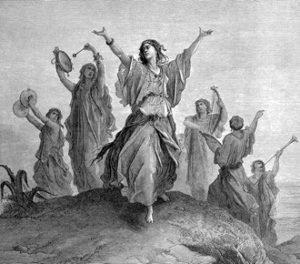
There is much mercy in these laws. The Book of Ruth is the story of a Moabitess, a woman born outside the covenant promises. Though an enemy of the people of God by birth, after she is made a widow, she makes a decision to cast her lot with her mother-in-law, Naomi, and trust the God of Israel, the Keeper of the Promises. In spite of the legal restrictions that would keep her from entering into the assembly, she lays claim to the merciful provisions in the law for foreigners, such as the right to glean in the fields of the harvesters. Through the laws of the Levirate marriage, she is grafted into the covenant people of God and restores the lost inheritance of the household of Elimelech (literally meaning, ‘God is my King’) to the house of Israel. Through her marriage to Boaz she becomes the mother of Obed, the great grandmother of King David, and the ancestor of the Messiah. By grace, she is included in the royal lineage of the Son of God (Matthew 1:5; Luke 3:32).
THE CALL TO PURITY AND COMPASSION
Verse 14 reminds us of our call to holiness as the people of God.
Deuteronomy 23:14 (NASB) 14 “Since the LORD your God walks in the midst of your camp to deliver you and to defeat your enemies before you, therefore your camp must be holy; and He must not see anything indecent among you or He will turn away from you.
The Bible acknowledges the existence of slavery in this broken world, and the fact that God’s people had experienced slavery in Egypt. Yet nowhere in the Bible is slavery commended by God. Instead we read,
Deuteronomy 23:15 (NASB) 15 “You shall not hand over to his master a slave who has escaped from his master to you.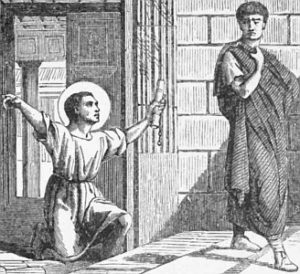
We see an example of this when Paul writes to a former slave owner, Philemon, and asks him to receive back his runaway slave forever, no longer as a slave, but more than a slave, a beloved brother. (Philemon 1:15-16)
When former slave-trader, John Newton, was converted, he repented of his sin. He had Deuteronomy 24:22 written out in large letters and hung over his mantel piece:
22 “You shall remember that you were a slave in the land of Egypt; therefore, I am commanding you to do this thing.
Further social laws are given in Deuteronomy 23, laws forbidding prostitution (23:17), forbidding charging interest on a loan to a brother (23:19), and the command that everyone perform their vows (keep their word, 23:23). The law reminds us that we can enjoy the prosperity of others without selfishly claiming them or taking advantage of them (23:24-25).
THE LAW PERTAINING TO DIVORCE AND MARRIAGE
It was the passage of Scripture found in Deuteronomy 24:1 that the Pharisees had in mind when they asked Jesus, “Is it lawful for a man to divorce his wife for any reason at all”. (Matthew 19:3).
In Jesus’ day there were two rabbinical schools, each interpreting this law differently. The liberal view of divorce, believing that divorce was permissible “for any reason at all” was upheld by the school of Hillel. The more conservative view that divorce was permitted only for something as serious as adultery was put forth by the school of Shammai. If it were actually a case of adultery, under the Law of Moses, the offenders would have been stoned and a divorce would not be necessary.
Jesus does not quote a rabbi. Instead He clarifies that these laws were given due to the heartlessness existent in both men and women. The practice of putting away wives was already common in Moses’ day. This law was designed to regulate a practice that was not ordained by God. This law still viewed the divorce and remarriage as a defilement (v.4). God hates divorce (Malachi 2:16). Yet the law protected women from being abused by husbands who failed to love, provide and protect them.
Jesus, as the Law-Giver Himself, calls His followers to a higher understanding. In the same spirit in which Jesus had contrasted His teaching with the law, “You have heard it said…but I say unto you”, He brings us back to the mind of God expressed in the book of Genesis (2:24), clarifying that marriage is intended to be a community of oneness birthed by God, a lasting ‘one-flesh unit’, a holy covenant relationship between a man and a woman.
“What therefore God has joined together, let no man separate.” (Matt 19:5)
It is important to remember that divorce is not the unforgiveable sin.
A newly married man was to spend a year at home before being sent away in the army or sent on official duty. This did not mean that they were to take the year off from all responsibilities. The law affirmed that a young groom should give priority to the happiness of their wife, nurture the relationship, and begin a family. A husband drafted into the army or on official duty was in danger of not returning. To ensure that there was time to conceive a child to continue the family line, the husband was not to be sent away for a year.
Just as conjugal rights were being upheld by the law, so also the right to earn a living. Therefore, the means of making a living were not to be taken as security for a loan (24:6).
Special laws were given forbidding the evil practice of kidnapping, protecting the rights of property owners, and safeguarding public health when there were known cases of infectious diseases (24:8-9).
The Lord gave laws to ensure the protection of employees and provisions for the poor and vulnerable, such as orphans, foreigners and widows.
In regard to criminal justice, there were limits put upon administered punishments (a maximum of 39 stripes were to be given if a person was sentenced to be whipped).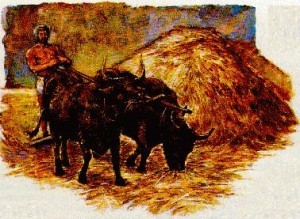
The ox that treads out the grain is not to be muzzled (25:4). Not only does this law protect the animal and provide for its well-being, but the law applies to workers. The apostle Paul applies this to the man who labors in spiritual things, insisting that his material needs should be taken care of. (1 Cor 9:9-11)
The law of a Levirate Marriage ensures that the allotted inheritance belonging to a family of a tribe of Israel will be passed on to future generations. If a husband dies without an heir, his widow is to marry a brother or a near relative. Their first child of the new marriage is to preserve the name of the dead brother (Deut 25:5-10). In the Book of Ruth, we see how this law is applied to restore the name of the deceased, Elimelech- (God is my king), to the people of Israel. Elimelech leaves Israel to live in Moab. There he dies along with his two sons. One daughter-in-law, Ruth, returns with Elimelech’s widow to Israel. Naomi is too old to bear a child. Ruth is refused by a closer relative, and therefore there is a ceremony at the town gate in which he takes off his sandal, which is a symbol of his relinquishing any land rights belonging to the deceased relative. Boaz, a kinsman, then consents to marry Ruth.
Some protest that Leviticus 20:21 forbade a man from marrying his brother’s wife. That law only applies if his brother were still alive. So, the laws do not contradict each other.
Amalek proved to be an enemy to Israel in Exodus 17:8-15. In Deuteronomy 25:17-19, Moses reminds the Israelites to blot out the memory of Amalek. Just as we have seen with Ammon and Moab, Amalek also becomes a type of the flesh which produces its deadly works (Galatians 5:19-21).
Galatians 5:17 (NASB) 17 For the flesh sets its desire against the Spirit, and the Spirit against the flesh; for these are in opposition to one another, so that you may not do the things that you please.
Romans 13:14 (NASB) 14 But put on the Lord Jesus Christ, and make no provision for the flesh in regard to its lusts.
Romans 8:7 (NASB) 7 because the mind set on the flesh is hostile toward God; for it does not subject itself to the law of God, for it is not even able to do so,
READING FROM THE NEW TESTAMENT- Luke 10:13-37
The deity of Jesus is evident in His bold claims in this passage. 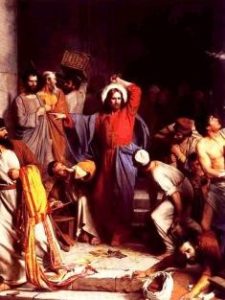
Jesus claims to know what will happen at the Final Judgment.
Luke 10:13-15 (NASB) 13 “Woe to you, Chorazin! Woe to you, Bethsaida! For if the miracles had been performed in Tyre and Sidon which occurred in you, they would have repented long ago, sitting in sackcloth and ashes. 14 But it will be more tolerable for Tyre and Sidon in the judgment than for you. 15 And you, Capernaum, will not be exalted to heaven, will you? You will be brought down to Hades!”
He claims that anyone who rejects the message, or the messenger He sends, is rejecting Him. He claims that anyone who rejects Him, rejects God.
He also claims to have witnessed the occasion of Lucifer’s fall (v.18), has authority over Satan and has the right to delegate that authority to His followers (v.19).
He says that the Father has entrusted everything to Himself. The apostle Paul would explain that the complete content of deity existed in Christ (Colossians 1:19, 2:9). He made known the Father and the Father dwelled in Him.
John 6:57 57 “As the living Father sent Me, and I live because of the Father
John 8:29 29 “And He who sent Me is with Me;
John 10:38 38 “the Father is in Me, and I in the Father.
John 14:10 10 “Do you not believe that I am in the Father, and the Father is in Me?
John 17:21 21” that they may all be one; even as You, Father, are in Me and I in You,
Jesus also claims that only He has the authority to decide to whom He will reveal the Father (v.22). Any perception of these spiritual truths is a gift of God’s grace (v. 21-24).
In Luke 10:34 Jesus is tested by an expert in the law who asks the question: “What must I do to inherit eternal life?” Jesus responds to the question with a question. “What is written in the law? How does it read to you?” The expert in the law replies quoting the Great Commandment:
Luke 10:27-28 (NASB) 27 And he answered, “YOU SHALL LOVE THE LORD YOUR GOD WITH ALL YOUR HEART, AND WITH ALL YOUR SOUL, AND WITH ALL YOUR STRENGTH, AND WITH ALL YOUR MIND; AND YOUR NEIGHBOR AS YOURSELF.”
28 And He said to him, “You have answered correctly; DO THIS AND YOU WILL LIVE.”
He answered correctly, but couldn’t do it. In fact, no one can do it. We cannot do anything to inherit eternal life. Someone has to do it for us!
We have all failed to keep the great commandment of loving God and neighbor. Therefore, we are in the wrong with God and need to be put in the right. This is what it means to be justified (put in the right with God) by God. Yet this man sought to justify himself.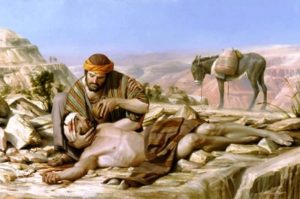
His excuse for his failure to love God with his whole being and his neighbor as himself is that he does not know who his neighbor is.
Jesus explains that his neighbor is the person in front of you, nearby you, or a person from afar; a person whom in a given moment you can help.
We often think of the story Jesus tells as “The Parable of the Good Samaritan”. Jesus never calls it that. In fact, he never calls the Samaritan ‘good’. Nor does he call any man ‘good’ (Matthew 19:17; Mark 10:18). Luke calls him a ‘certain’ Samaritan.
In this story, a man was going down on the road to Jericho from Jerusalem and is beaten by robbers and left half dead. The locals pass by, the priest and the Levite, from Jerusalem. They see the man in need but pass on the other side. A man far away from home, and a man who is traditionally despised by the Jews, a Samaritan, sees the man who has been beaten, is moved with compassion, bandages his wounds, pours oil and wine on them and puts him on his own beast. He cancels his plans, brings him to an inn, and stays overnight to take care of him. On the next day he gives his money to the innkeeper instructing him to continue to take care of the man, and, no matter what the cost, put it on his tab.
Jesus asked, “Which man proved to be a neighbor?” The lawyer responded, “The one who showed mercy on him.” Jesus said, “Go and do the same.”
The man who showed mercy was not the man you would expect. He would not be considered a Law-abiding religionist.
Yet he exhibited compassion- a love for neighbor that is born out of the love of God.
We see Jesus as the certain Samaritan. The Jews looked down upon Samaritans. Jesus was not esteemed by the Levite or priest. But He proves to be a neighbor to us who have been subject to the fall, beaten up and left half dead. We are totally dead spiritually, even though our physical bodies may be alive. Jesus demonstrates not only the sacrifice that brings us back to life, but his salvation provides unlimited resources for our care. Thank God for this kind of love!
READING FROM THE PSALMS
Psalm 75 is one that anticipates victory. God is in control. His timing is perfect (v.2). He is the Judge (v.7) and His judgments are just (v.2). It is He who sovereignly puts down one and exalts another (v.7). He will uphold righteousness and the cup of wrath is in His hand.
TODAY’S PROVERB
Proverbs 12:12-14 (NASB) 12 The wicked man desires the booty of evil men, But the root of the righteous yields fruit. 13 An evil man is ensnared by the transgression of his lips, But the righteous will escape from trouble. 14 A man will be satisfied with good by the fruit of his words, And the deeds of a man’s hands will return to him.”
The writer of these proverbs contrasts the desires and habits of someone who is walking with God in righteousness and someone who is not. One desires the plunder of evil men. The other desires to feed others the fruit of their relationship with God. One’s tongue continually gets them in trouble. The others know how to avoid or escape trouble. One enjoys the consequences of their good words that are followed by action. The other experiences the consequences of their evil deeds.
PRAY FOR THE NATIONS
We continue to pray for the Republic of Chad. (p. 206-207 in Operation World)
The Church needs uplifting in prayer, especially regarding the following issues:
- African traditional religions are resurgent in the country, partly as an attempt to return to African roots. Tribal initiation rites are becoming a divisive issue for Christians. Pray also for liberation from all bondages by a deep working of the Holy Spirit in every congregation.
- The deception of the sects and secret societies. Groups such as Rosicrucians, Masons and other specifically African quasi-Christian groups seek to lead Chadians astray. Pray for solid teaching that will enable Christians to discern between truth and lies.
- Nominalism is a challenge, even in Chad. Good discipleship and teaching are the antidote to this.
- Tribalism and petty legalism cripple many congregations. Tribal rivalries and resentments (especially south-north) prevent Christian witness.
- While most Protestant and Independent groups are evangelical, unity within and among denominations is under strain. Pray for the EEMET (Evangelical Alliance) and the Pentecostal alliance as both attempt to unite Christians.
- Vision for outreach. Ambitious, countrywide goals have dissipated, and some initiatives that had notable impact in the past have faded almost to nothing. Churches need to gain a passion for ministry that includes praying and giving as well as outreach.
Pray for God to raise up catalysts who will spur Chad’s Christians to greater depths of faith and a greater commitment to the unevangelized.
Training of leaders remains a major challenge. Poverty, instability, violence, poor communication and lack of both financial wherewithal and management hinder training of pastors and evangelists.
There are more unreached peoples in Chad than in any other African country. A number of agencies, cooperating admirably, are making progress with previously unreached peoples.
PRAYER: Father, Your Word is true, pure and perfect. It is all sufficient and trustworthy. We thank You for the Word made flesh. Lord Jesus we embrace You by faith as our all and in all. We rest in Your provision of a finished work of redemption. You are all our righteousness. Holy Spirit reveal the righteous life of Christ within us and express His life through us. In Jesus’ Name. Amen.
Pastor David
New Life Community Church, Concord
